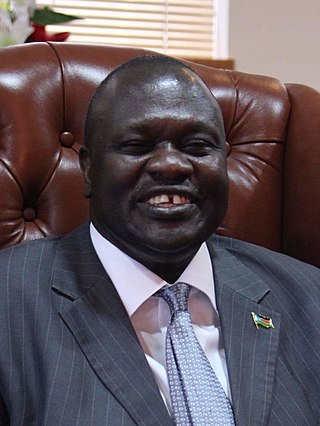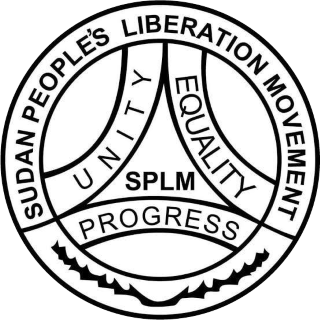Related Research Articles

Dr. John Garang De Mabior was a Sudanese politician and revolutionary leader. From 1983 to 2005, he led the Sudan People's Liberation Army/Movement as a commander in chief during the Second Sudanese Civil War. He served as First Vice President of Sudan for three weeks, from the comprehensive peace agreement of 2005 until his death in a helicopter crash on July 30, 2005. A developmental economist by profession, Garang was one of the major influences on the movement that led to the foundation of South Sudan’s independence from the rule of Sudanese president Omar al-Bashir.

Riek Machar Teny Dhurgon is a South Sudanese politician who has served as the First Vice President of South Sudan since 2020.

The Sudan People's Liberation Movement is a political party in South Sudan. It was initially founded as the political wing of the Sudan People's Liberation Army in 1983. On January 9, 2005 the SPLA, the SPLM and the Government of Sudan signed the Comprehensive Peace Agreement, ending the civil war. SPLM then obtained representation in the Government of Sudan, and was the main constituent of the Government of the then semi-autonomous Southern Sudan. When South Sudan became a sovereign state on 9 July 2011, SPLM became the ruling party of the new republic. SPLM branches in Sudan separated themselves from SPLM, forming the Sudan People's Liberation Movement–North. Further factionalism appeared as a result of the 2013–2014 South Sudanese Civil War, with President Salva Kiir leading the SPLM-Juba and former Vice President Riek Machar leading the Sudan People's Liberation Movement-in-Opposition.
Dr.Lam Akol Ajawin, is a South Sudanese politician of Shilluk descent. He is the current leader of National Democratic Movement (NDM) party. He is a former high-ranking official in the Sudan People's Liberation Army (SPLA), and subsequently became the Foreign Minister of Sudan from September 2005 to October 2007, when the Khartoum government offered the SPLA several other key ministries as part of a peace agreement.

The SPLA-Nasir was a splinter faction of the Sudan People's Liberation Army (SPLA), a rebel group that fought in the Second Sudanese Civil War. Originally created as an attempt by the Nuer tribe to replace SPLA leader John Garang in August 1991, it gradually became coopted by the government. The break away of Riek Machar from SPLM/A resulted in Nuer ethnic group massacring Garang's ethnic Dinka from Bor in the Bor massacre in 1991. This split resulted in the 1994 National Convention of New Sudan in Chukudum.
Daniel Koat Mathews, popularly known as DK Mathews, was a prominent politician and Nuer leader, who held several government positions and has been effectively involved in the national politics for many years. He was a major general in the Sudan People's Liberation Army now known as South Sudan People's Defense Forces.
William Nyuon Bany Machar was a Southern Sudanese politician who was also one of the founders of the Sudan People's Liberation Army (SPLA). He was appointed third in command after John Garang and Kerubino Kuanyin Bol. While he worked as a commander of the SPLA he lived in Itang, a small Ethiopian town in the Gambela Region.
Kuol Manyang is a South Sudanese politician. He is a member of the SPLM. He became governor of Jonglei state on 15 December 2007, following the first former governor, Philip Thon Leek from Dinka Bor, to curb cattle raiding and abduction of children in the region.
Yousif Kuwa Mekki was a Sudanese revolutionary, rebel commander and politician.

The South Sudan People's Defence Forces (SSPDF), formerly the Sudan People's Liberation Army (SPLA), is the military force of the Republic of South Sudan. The SPLA was founded as a guerrilla movement against the government of Sudan in 1983 and was a key participant of the Second Sudanese Civil War, led by John Garang. After Garang's death in 2005, Salva Kiir was named the SPLA's new Commander-in-Chief. As of 2010, the SPLA was divided into divisions of 10,000–14,000 soldiers.
Peter Gatdet Yak, better known as Peter Gadet, was a South Sudanese general and SPLA commander who became the leader of the South Sudan Liberation Army (SSLA), a rebel movement in South Sudan.
Paulino Matip Nhial, or Matiep Nhial, was a military leader and politician in South Sudan.
Gordon Kong Chuol is a former militia commander in South Sudan, who fought for the Sudan People's Liberation Army (SPLA) and later for the forces led by Riek Machar during the Second Sudanese Civil War.
Kerubino Kuanyin Bol was a Sudanese rebel leader who was one of the founders of the Sudan People's Liberation Movement (SPLM) and one of the leaders of the Sudan People's Liberation Army (SPLA) during the Second Sudanese Civil War and was said to have fired the first shot in the war.
Tito Biel Chuor was a high-ranking commander in the South Sudan Defense Forces (SSDF) during the Second Sudanese Civil War (1983–2005).
The Khartoum Peace Agreement of 1997 was an agreement made on 21 April 1997 between the Khartoum-based government of Sudan and various militia leaders from South Sudan during the Second Sudanese Civil War (1983-2005). The agreement formalized principles that had been agreed in a political charter signed in Khartoum on 10 April 1996.
The South Sudan Democratic Movement (SSDM), sometimes called the South Sudan Democratic Movement/Army (SSDM/A), was a South Sudanese militant group. Along with its armed wing, the South Sudan Defence Army (SSDA), rebelled against the government of South Sudan led by President Salva Kiir Mayardit and the Sudan People's Liberation Movement.
The Relief Association of Southern Sudan was a humanitarian organization in Sudan, operating during the Second Sudanese Civil War. It was the humanitarian wing of the forces of Riek Machar 1991-2003. SPLA-Nasir set up RASS to function as a local civilian authority, and for liaisons with United Nations agencies and NGOs. As of 1999, Simon Kun served as executive director of RASS.
The Bor massacre was a massacre of an estimated 2,000 civilians in Bor on November 15, 1991 during the Second Sudanese Civil War. The massacre was carried out mostly by Nuer fighters from SPLA-Nasir, led by Riek Machar, and the militant group known as the Nuer White Army, shortly after Machar split off from the SPLA led by John Garang. Amnesty International said at least 2,000 Dinka were killed, though the real number may have been higher. In the years which followed, an estimated 25,000 more died from famine as their cattle were either stolen or shot and the fighting had displaced them from the land they had once cultivated. At the time, Riek Machar described the incident as "propaganda" and "myth". In 2012, he publicly apologized for his part in the massacre.
Simon Gatwech Dual is a Sudanese rebel Major General who was born in around the late 1930s in what is today Uror County, Jonglei state, South Sudan.
References
- 1 2 3 "Famine in Audan, 1998". Human Rights Watch . 21 April 1997. Retrieved 26 September 2022.
- 1 2 "The Martyrs' Day: Arok Thon Arok". PaanLuel Wël. 2012.
- 1 2 3 4 5 6 "SPLM/A Leaders Bio-data,Profile,and Personalities". simonrgd.com. 15 September 2005. Archived from the original on 31 January 2009. Retrieved 26 September 2022. (reliability unknown)
- 1 2 "Vice President of Sudan dies in plane crash". CBC News . 13 November 1998. Archived from the original on 25 October 2012. Retrieved 26 September 2022.
- ↑ "Sudan buries plane crash victims". BBC News. 13 February 1998. Retrieved 30 August 2013.